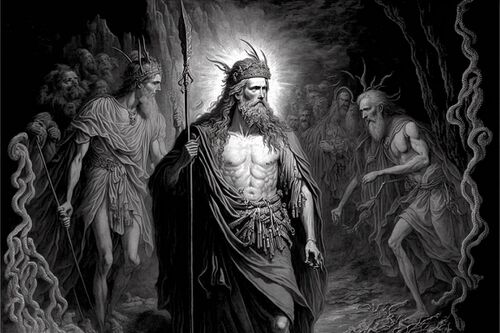More actions
Added key concepts. |
m Added desc. |
||
| Line 1: | Line 1: | ||
{{SHORTDESC:The poetry that defined heroism and adventure.}} | |||
{{Large|Epic Poetry: The Stories of Heroes, Gods, and Monsters}} | {{Large|Epic Poetry: The Stories of Heroes, Gods, and Monsters}} | ||
[[File:Grlucas Odysseus Dore.jpg|thumb|500px|Odysseus in the Underworld]] | [[File:Grlucas Odysseus Dore.jpg|thumb|500px|Odysseus in the Underworld]] | ||
Revision as of 10:40, 6 January 2025
Epic Poetry: The Stories of Heroes, Gods, and Monsters

Enter the world of epic poetry and experience the stories of heroic figures whose tales have captivated audiences for centuries. From the noble deeds of Achilles in the Iliad to the adventurous journey of Odysseus in the Odyssey, epic poetry offers a window into the fascinating world of ancient Greece.
In this genre, heroes are the centerpieces of their stories, as they battle against gods, monsters, and their fellow humans to protect their honor and secure their place in history. Their journey often includes encounters with gods, strange lands, and difficult ethical dilemmas, making for a truly thrilling reading experience.
Epic poetry has had a significant impact on Western culture, influencing everything from literature and film to politics and philosophy. By studying epic poetry, you’ll not only gain a deeper understanding of ancient Greek culture but also develop critical reading and analytical skills that will serve you well in your academic and professional pursuits.
Key Concepts and Questions
Consider these concepts as a guide for your assigned reading and research. Having a grasp of these elements will give you a strong understanding of the topic and prepare you for the discussions and exam.
- Definition and Scope: Epic poetry is a lengthy narrative form that recounts the significant deeds of heroes, often intertwined with the fate of nations or peoples. These narratives are typically set on a grand scale, encompassing vast settings and extensive time periods.
Key Question: How does the expansive scope of epic poetry enhance its exploration of universal human experiences? - Formal Structure: Epics are characterized by formal elements such as elevated language, invocation of the muse, in medias res openings, and the use of epic similes. These conventions contribute to the grandeur and seriousness of the narrative.
Key Question: How do the formal elements of epic poetry shape the way the story is told and understood? - Heroic Ideals: Central to epic poetry is the portrayal of heroes who embody the virtues esteemed by their cultures, such as courage, honor (timē), and excellence (aretē). These figures often undertake perilous journeys and face formidable challenges.
Key Question: How do epic heroes reflect the cultural values of their societies, and how do those values compare to modern ideals? - Role of the Divine: Interactions between mortals and deities are a common feature, reflecting the belief in divine influence over human affairs. Gods and supernatural beings frequently intervene, aiding or hindering the hero’s quest.
Key Question: What does the role of the gods in epic poetry reveal about the relationship between humans and the divine in ancient cultures? - Cultural Reflection: Epics serve as cultural artifacts, encapsulating the values, beliefs, and historical narratives of the societies from which they emerge. They offer insights into the collective identity and moral frameworks of these cultures.
Key Question: In what ways do epic poems function as mirrors of the societies that produced them? - Oral Tradition: Many epics originated from oral storytelling traditions, which influenced their repetitive structures and formulaic expressions, aiding memorization and transmission across generations.
Key Question: How does the oral tradition shape the structure and style of epic poetry? - The Hero’s Journey: A recurring motif is the hero’s journey, encompassing stages such as the call to adventure, trials, and the return. This narrative arc reflects universal patterns of human experience and personal growth.
Key Question: How does the hero’s journey in epic poetry reflect universal human experiences, and how does it resonate with modern narratives? - Moral and Ethical Themes: Epic poetry often explores profound themes like fate versus free will, the nature of justice, and the quest for immortality, prompting readers to reflect on ethical and philosophical questions.
Key Question: What ethical dilemmas are presented in epic poetry, and how do they challenge or affirm the hero’s actions? - Influence on Literature: The conventions and themes of epic poetry have impacted subsequent literary works, establishing archetypes and narrative structures that resonate through various genres, like novels and film.
Key Question: How have the themes and conventions of epic poetry influenced modern literature and storytelling? - Contemporary Relevance: Studying epic poetry allows for an understanding of how ancient narratives address timeless human concerns, offering perspectives that remain pertinent in modern discourse.
Key Question: How can the themes of epic poetry help us better understand challenges and questions in contemporary society?
Permalink: https://grlu.us/epic
